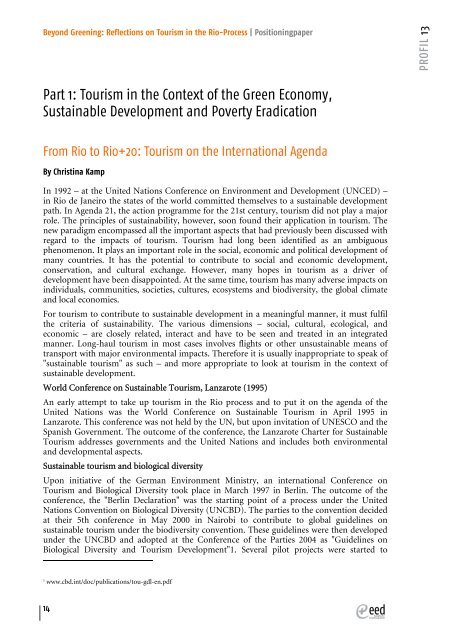<strong>Beyond</strong> <strong>Greening</strong>: Reflections on <strong>Tourism</strong> in the Rio-Process | PositioningpaperPart 1: <strong>Tourism</strong> in the Context of the Green Economy,Sustainable Development and Poverty EradicationFrom Rio to Rio+20: <strong>Tourism</strong> on the International AgendaBy Christina KampIn 1992 – at the United Nations Conference on Environment and Development (UNCED) –in Rio de Janeiro the states of the world committed themselves to a sustainable developmentpath. In Agenda 21, the action programme for the 21st century, tourism did not play a majorrole. The principles of sustainability, however, soon found their application in tourism. Thenew paradigm encompassed all the important aspects that had previously been discussed withregard to the impacts of tourism. <strong>Tourism</strong> had long been identified as an ambiguousphenomenon. It plays an important role in the social, economic and political development ofmany countries. It has the potential to contribute to social and economic development,conservation, and cultural exchange. However, many hopes in tourism as a driver ofdevelopment have been disappointed. At the same time, tourism has many adverse impacts onindividuals, communities, societies, cultures, ecosystems and biodiversity, the global climateand local economies.For tourism to contribute to sustainable development in a meaningful manner, it must fulfilthe criteria of sustainability. The various dimensions – social, cultural, ecological, andeconomic – are closely related, interact and have to be seen and treated in an integratedmanner. Long-haul tourism in most cases involves flights or other unsustainable means oftransport with major environmental impacts. Therefore it is usually inappropriate to speak of"sustainable tourism" as such – and more appropriate to look at tourism in the context ofsustainable development.World Conference on Sustainable <strong>Tourism</strong>, Lanzarote (1995)An early attempt to take up tourism in the Rio process and to put it on the agenda of theUnited Nations was the World Conference on Sustainable <strong>Tourism</strong> in April 1995 inLanzarote. This conference was not held by the UN, but upon invitation of UNESCO and theSpanish Government. The outcome of the conference, the Lanzarote Charter for Sustainable<strong>Tourism</strong> addresses governments and the United Nations and includes both environmentaland developmental aspects.Sustainable tourism and biological diversityUpon initiative of the German Environment Ministry, an international Conference on<strong>Tourism</strong> and Biological Diversity took place in March 1997 in Berlin. The outcome of theconference, the "Berlin Declaration" was the starting point of a process under the UnitedNations Convention on Biological Diversity (UNCBD). The parties to the convention decidedat their 5th conference in May 2000 in Nairobi to contribute to global guidelines onsustainable tourism under the biodiversity convention. These guidelines were then developedunder the UNCBD and adopted at the Conference of the Parties 2004 as "Guidelines onBiological Diversity and <strong>Tourism</strong> Development"1. Several pilot projects were started to1www.cbd.int/doc/publications/tou-gdl-en.pdf14
<strong>Beyond</strong> <strong>Greening</strong>: Reflections on <strong>Tourism</strong> in the Rio-Process | Positioningpaperimplement these guidelines. A Consulting Unit of the World <strong>Tourism</strong> Organization(UNWTO) on Biodiversity and <strong>Tourism</strong> for Tsunami Affected Countries was set up in Bonn.2Commission on Sustainable Development (UN-CSD-7), New York (1999)In 1997, the United Nations Special General Assembly adopted a resolution on "Sustainable<strong>Tourism</strong>"3 as part of its "Programme for the further implementation of Agenda 21", the actionprogramme adopted at the Rio Earth Summit. This resolution acknowledges the need toconsider further the importance of tourism in the context of Agenda 21. Among other things,it states: "For sustainable patterns of consumption and production in the tourism sector, it isessential to strengthen national policy development and enhance capacity in the areas ofphysical planning, impact assessment, and the use of economic and regulatory instruments, aswell as in the areas of information, education and marketing." Furthermore, the resolutionstates that "policy development and implementation should take place in cooperation with allinterested parties, especially the private sector and local and indigenous communities".Following the mandate by the UN Special General Assembly, the United Nations Commissionon Sustainable Development (UNCSD) at its 7th session in April 1999 in New York adopted acomprehensive programme of work on tourism and sustainable development. The UNCSD isthe high-level forum for sustainable development within the United Nations system. In itsdecision of 1999, the UN Commission calls upon governments, the tourism industry, majorgroups and the UN system to take concrete action. It considers economic, environmental,social and cultural aspects of tourism and stresses the involvement and cooperation of allmajor groups (as defined in Agenda 21) and the principle of participation.The International Year of Ecotourism (2002)One of the most contested initiatives at the international level was the International Year ofEcotourism 2002 (IYE), declared by the United Nations. It was led by the World <strong>Tourism</strong>Organization and the United Nations Environment Programme (UNEP). The Third WorldNetwork called for an assessment of "eco-tourism" instead of promoting it through a UN year.NGOs feared that under the guise of eco-tourism, new niche markets would be opened up.UNEP confirmed in its evaluation of the IYE that the results were mixed.4 Eco-tourism canhelp protect biological diversity and benefit local communities, but there was also "greenwashing". The conclusion was that the challenge consisted in applying the principles of ecotourismto all forms of tourism.The Millennium Development Goals (MDGs)With the Millennium Development Goals (MDGs)5 of the United Nations (2001), theinternational community placed poverty alleviation at the top of the agenda. By 2015, thepercentage of people living in extreme poverty should be halved. The World <strong>Tourism</strong>Organization (UNWTO), since 2003 a specialized agency of the United Nations, started topromote tourism as a tool for poverty alleviation.6 However, NGOs question whether tourism2http://biodiv.unwto.org/en/content/about-us-93www.un.org/documents/ga/res/spec/aress19-2.htm4 United Nations Environment Programme (UNEP): Outcomes of the IYE 2002 Three main conclusions.5www.un.org/millenniumgoals/6 Vgl. World <strong>Tourism</strong> Organization (WTO) (2002): <strong>Tourism</strong> and Poverty Alleviation. Madrid. Vgl. World <strong>Tourism</strong> Organization (WTO)(2004): <strong>Tourism</strong> and Poverty Alleviation. Recommendations for Action. Madrid.15












